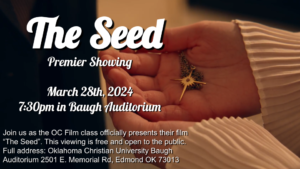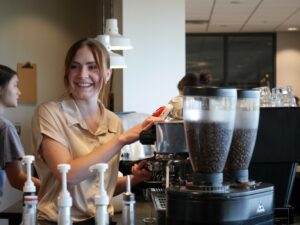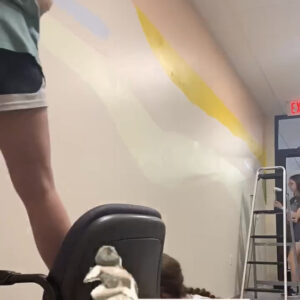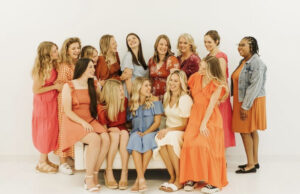After spending the semester discussing ethical issues in practices, Oklahoma Christian University’s Ethics Team won first place in the Texas Regional Ethics Bowl on Nov. 10.
Hadley LaMascus, Brendan McKinley and Ruger Stocking comprise one ethics team and won all three of their rounds at Regionals, securing them first place. Tyler Clark, Sam Day and Allyson Clubb are Oklahoma Christian’s other ethics team, winning two of their rounds and tying for the third, giving them sixth place overall. Although the teams compete separately, they practice together with Dean of the College of Business Administration Jeff Simmons coaching.
Following the state competition in October, the Regional Ethics Bowl took place at St. Mary’s University in San Antonio, Texas. The event included three rounds, in which two teams present their cases before three judges and a moderator, who keeps track of the judges’ scores and tells the teams the case and question.
According to Clubb, each round begins with a coin toss, and the winning team chooses whether to present first or second. The moderator tells them which case they will be discussing, after which the first team has 10 minutes to present their case.
The second team then comments on the first team’s presentation by critiquing their arguments or asking questions they failed to answer. Following this, the first team has five minutes to respond to the commentary. The judges then ask the first team questions. The process repeats with the second team receiving a new case and question to present.
“Two of the three judges must agree that one team won for them to be considered the winners,” Clubb said. “There is a point system, but that comes more into play if multiple teams won the same number of rounds at the end of the day.”
According to Clubb, Regionals sent universities nine cases at the beginning of the semester. She said the topics included: Does banning un-stunned meat for the purpose of animal rights overcome the infringement on religious liberty, should victims be allowed to pardon crimes like a family member’s murder and how to program self-driving cars when they are put in a situation in which someone will be hit no matter what.
“Most of the time, the cases seem pretty straight-forward at face value but when you start discussing them more and more, there were many other levels to take into consideration,” Clubb said. “For example, the pardoning case seems preferable at first, but then we had to consider if that was truly justice and the implications of universalizing such a policy.”
Oklahoma Christian’s team practices twice a week from 6 a.m. to 8 a.m., and Clubb said these practices are mostly the team discussing the cases and different aspects involved.
“It depends on the case, but we can usually see tension between two or more main issues and have to decide which was most ethical or the most ethical solution,” Clubb said. “During practice, we discuss the ethical theories—like utilitarianism or care ethics—that could lead us to an answer, and then we go through the same format as an actual round to practice presenting the case and make our points stronger.”
This is Clubb’s first year on the ethics team, and she said she wanted to join because of its application to the real world.
“We encounter ethics every day, but it is challenging to question why we believe what we do,” Clubb said. “This is also a great way to represent OC in the intercollegiate level, and the team’s unity is another bonus. Being a part of OC’s ethics team has definitely expanded my worldview and has made me pause before saying, ‘This is the right answer.’ Looking at a problem from all different angles is an important part of any field and trains our analyzing skills.”



















Be First to Comment